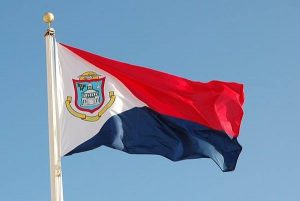Bosman-law gives St. Maarten more control over independence
 PHILIPSBURG — The Dutch parliamentary committee Kingdom Relations postponed handling a draft initiative kingdom law submitted by VVD parliamentarian André Bosman this week until there is an advice from the Council of State. The draft law aims to give Curacao and St. Maarten more leeway in case they opt for independence; it also makes it possible for Statia, Saba and Bonaire to leave the kingdom if they wish to do so.
PHILIPSBURG — The Dutch parliamentary committee Kingdom Relations postponed handling a draft initiative kingdom law submitted by VVD parliamentarian André Bosman this week until there is an advice from the Council of State. The draft law aims to give Curacao and St. Maarten more leeway in case they opt for independence; it also makes it possible for Statia, Saba and Bonaire to leave the kingdom if they wish to do so.
This Bosman-law stipulates that “Aruba, Curacao and St. Maarten are able to declare by national ordinance that they wish to leave the legal order as described in the Kingdom Charter.” Aruba negotiated this option already in 1994; Bosman wants to restore what he calls the imbalance in the Kingdom Charter by creating the same option for Curacao and St. Maarten.
The BES-islands are not mentioned anymore in the Kingdom Charter; after the dismantling of the Netherlands Antilles in 2010 they became Dutch public entities. Under that regime, the islands cannot opt for independence. Bosman wants to put them back into the charter. “If they are kept outside of the right to secede, it becomes impossible for them to step out of the kingdom, the way this is impossible for (the Dutch island of) Texel,” Bosman writes in the explanatory memorandum.
The exact text of the draft law will only be made public after it has been submitted to the Second Chamber for handling. Currently it awaits advice from the Council of State, but the explanatory memorandum gives a good insight in Bosman’s objectives.
The VVD-MP, member of the parliamentary committee Kingdom Relations, refers in the memorandum to a decision made during the kingdom conference on December 14, 2011, in The Hague. On that occasion, the prime ministers of Aruba, Curacao and St. Maarten and the Dutch minister of Kingdom Relations agreed to amend articles 58, 59 and 60 of the kingdom charter “during the next amendment of the charter.” However, during the next kingdom conferences in 2014 and 2015, the subject was not brought up again.
Article 58 regulates Aruba’s right to leave the kingdom by national decree. It requires a referendum and a two third majority in favor of leaving.
Bosman wants to include Curacao and St. Maarten in article 58, drop the requirement to hold a referendum and also drop the requirement of a two third majority. “It would be unfair if 65 percent wants independence but cannot get it because it requires a two third majority,” Bosman states in the explanatory memorandum.
If the Dutch parliament approves this Bosman-law, the parliaments of Curacao and St. Maarten are able to decide about independence by a simple majority. Such a decision would have to be accompanied by an outline of the “future constitution” that includes rules about basic rights, the government, the parliament, legislation, governance, the administration of justice and the amendment of the constitution.
Once this has been approved, the date for leaving the kingdom will be set by royal decree. It is likely that this will be a so-called “klein koninklijk besluit” (a decree) that is usually applied to the implementation of laws; unlike a AMvB (general measure) it does not require advice from the Council of State.
Bosman emphasizes that his proposal gives the countries the option to set their own rules for leaving the kingdom. While the draft drops the requirements of a referendum and a two third majority, the countries are free to re-introduce those requirements in a national ordinance.
Bosman refers in a remark about independence to the United Nations Charter: “Immediate steps shall be taken, in Trust and Non-Self-Governing Territories or all other territories which have not yet attained independence, to transfer all powers to the peoples of those territories, without any conditions or reservations, in accordance with their freely expressed will and desire, without any distinction as to race, creed or color, in order to enable them to enjoy complete independence and freedom.”
“The former colonizer is not allowed to stop this objective,” Bosman adds to this quote.
The explanatory memorandum notes that when everything is said and done, leaving the kingdom requires “a proper arrangement between the country that leaves and the other countries in the kingdom.”
###
Related article:
Opinion piece: “The will of the people” by Hilbert Haar


























